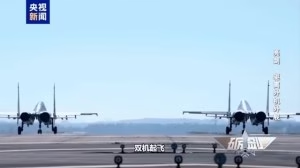Germany breaks taboo with first celebration of veterans since second world war

Germany will hold its first celebration of veterans since the second world war on Sunday, as the nation recalibrates its complex relationship with the armed forces in the wake of Russia’s invasion of Ukraine.
Defence minister Boris Pistorius will join current and former soldiers and members of the public taking part in a day of events across the country — including at a “veterans’ village” constructed in front of the Reichstag in Berlin.
It marks a historic shift in a nation where anything that could be viewed as a display of militarism was for years seen as taboo.
“There won’t be tanks and there won’t be fighter jets,” said Lieutenant Colonel Michael Krause, head of a newly formed national veterans’ office, who drew a contrast with big military events in other countries. “We’re not there yet. But we’re really taking a really good first step.”
Russian President Vladimir Putin’s full-scale invasion of Ukraine in 2022 has helped to change the political backdrop for military commemorations in Europe’s largest nation, analysts say. Germany has been pouring money and resources into the armed forces in response to Nato fears of Russian aggression. New chancellor Friedrich Merz has promised to make Germany’s military “the strongest conventional army in Europe.”
Sarah Brockmeier-Large, of the Peace Research Institute Frankfurt, said the fact that politicians had finally agreed to hold a veterans day was “emblematic of a growing appreciation in German society that we need a functioning armed forces — and that soldiers provide a vital public service”.

Berlin’s role in two world wars led to a deep scepticism of military force after 1945, especially in West Germany, and fed into the emergence of a strong pacifist movement.
For decades, the term veteran was mostly associated with those who had fought in Adolf Hitler’s Wehrmacht rather than the Bundeswehr, which was established in 1955 and put under tight parliamentary control.
“We couldn’t be proud of our former wars,” said Patrick Sensburg, head of the German reservists’ association. “So in the 50s, 60s and 70s, there was no veterans’ culture in the German Bundeswehr.”
During the cold war, when Germany was divided, the Bundeswehr only took part in operations outside Nato territory to help with natural disasters. After reunification in 1990, the East German National People’s Army was disbanded and a small number of troops absorbed into the Bundeswehr.
The new combined army soon tentatively began undertaking foreign combat operations. German warplanes helped bomb the former Yugoslavia in 1999 during the Nato-led Kosovo mission.
But most significant for the veterans’ movement was the participation of 93,000 German soldiers in the US-led war in Afghanistan over a span of almost 20 years.
Initially billed as a German peacekeeping mission, it morphed into a combat operation as Bundeswehr troops battled a Taliban insurgency. The conflict, which in total killed about 3,000 American and allied troops and more than 100,000 Afghan civilians, claimed the lives of 59 German soldiers.

Grassroots pressure from those who served in Afghanistan — including many who came home bearing physical and mental scars — created a drive for a veterans day inspired by the likes of Australia and New Zealand’s Anzac day, the UK’s armed forces day or veterans day in the US.
In 2012, then-defence minister Thomas de Maizière’s attempt to win approval for the idea failed amid widespread political opposition.
“I think it was too early,” said military historian Sönke Neitzel, who said German combat operations in Afghanistan were still seen at that time as something that “should never have happened”.
But the pressure continued from former soldiers and the associations that sprang up to take care of them.
Last year, German MPs approved a new plan to celebrate veterans “publicly and visibly” every year on June 15. Defence minister Pistorius described it as a “strong, important and, yes, an overdue signal of recognition and appreciation”.

Opposition to the idea has not disappeared. Die Linke, the far-left party that won 9 per cent of the vote in February’s parliamentary elections, will host a rival event in Berlin on Sunday entitled “We won’t celebrate your wars”.
It said the new veterans day — which comes as military leaders warn they must recruit tens of thousands of extra soldiers in the coming years — is an attempt to “make war palatable” and create “cannon fodder” for the German armed forces.
Feelings are complex in the eastern states that were part of the communist German Democratic Republic, where there is widespread opposition to Germany’s role as one of Ukraine’s biggest arms suppliers, partly due to the region’s historic ties to Russia.
But Katja Hoyer, a historian and author of Beyond the Wall: East Germany 1949-1990, said there was still broad support for the military and those who have served in it, with east Germans disproportionately represented in the lower ranks of the Bundeswehr.
“The idea of re-arming and building up the Bundeswehr is not a problem for a lot of east Germans,” she said. “There’s a difference between attitudes towards the military in general and this conflict [in Ukraine] in particular.”
The creation of an annual event has been welcomed by veterans themselves, even if some are still cautious.
Thorsten Gärtner, a Bundeswehr master sergeant who served five stints in Afghanistan and has suffered from post-traumatic stress disorder, said he still did not always feel comfortable wearing his uniform on public transport in Berlin.
“I hope that at some point we will get it right like in other countries, such as the US, where there is a veterans’ ID and a 10 per cent discount everywhere,” he said. “I have my doubts about that. Acceptance is not yet there. It takes a lot of time.”














